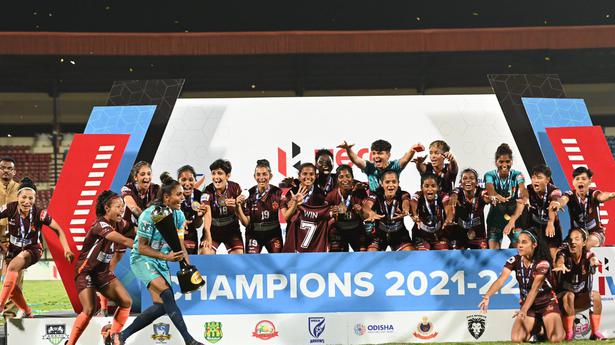
Explained | How will FIFA suspension impact Indian football?
The Hindu
Why did the world governing body of the sport take the step? Who is to blame? What lies ahead?
The story so far: Late on August 15, world football’s governing body FIFA suspended the All India Football Federation (AIFF) indefinitely for “undue interference by a third party” in the process to finalise a new constitution and elect office-bearers. The third party in question was the Supreme Court of India-appointed Committee of Administrators (CoA), comprising Justice (retd.) Anil Dave, former Chief Election Commissioner S.Y. Quraishi and former Indian football captain Bhaskar Ganguly, formed in May to temporarily assume charge of AIFF after the previous establishment, led by president Praful Patel, was deemed to have overstayed the National Sports Development Code of India-mandated 12-year tenure. If AIFF’s suspension is not revoked in time, India will lose the rights to host the U-17 Women’s World Cup in October.
International sports federations like FIFA view any governance structure where an unelected body wields power at a national sports federation like AIFF as third-party interference. In exceptional cases where such a body — in the present case, the CoA — takes charge, it is required to play a temporary, enabling role in line with the statutes of the international body. Ever since the CoA presented the draft constitution to FIFA on July 13, the latter has suggested multiple changes. Chief among them was a repeal of CoA’s decision to give players and State associations equal representation (50%) in the electoral college (36 votes each). The Sports Code mandates a minimum of 25% representation for players in decision-making roles. In a letter dated July 25, FIFA said, “Although we agree that the players’ voice needs to be heard, we are also of the view that the importance of the existing members of the AIFF should not be undermined. However, we understand the requirements of the Sports Code of India and recommend AIFF to bring in a presence of above 25% of the Eminent Players in the Executive Committee as Co-opted (nominated) Members.” FIFA didn’t approve of the fact that before the hearing in the Supreme Court on August 3, the CoA didn’t revise its equal representation clause. FIFA also took issue with the move to elect an interim body for three months just for the conduct of the World Cup, while the constitution is finalised parallelly. “We understood that the CoA would still play a role within the aforesaid interim mandate,” the FIFA letter conveying the suspension said, concluding that this too constituted “undue interference”.
In a statement put out a day after the suspension, the CoA expressed “surprise and disappointment” that FIFA’s decision had come even as extensive discussions were ongoing between FIFA, CoA and the Union Sports Ministry. The CoA said it was agreeable to conduct elections with an electoral college consisting of just 36 State representatives and give players representation as nominated members in the Executive Committee as desired by FIFA. In a separate letter, the CoA also assured FIFA that the interim Executive Committee would function independently and will not be supervised by the former. However, the electoral college published on August 16 — after the FIFA suspension was announced — had as many as 69 members, including 36 players. It is understood that changes to the draft constitution to bring it in line with FIFA recommendations will need the Supreme Court’s nod.
After mostly remaining in the background, the Union government, at the hearing on August 17, informed the Supreme Court that it was in discussions with FIFA. “Yesterday the government took it up. We had two meetings with FIFA. There is some breaking of the ice which has taken place,” the government said, and asked for more time. The next hearing is scheduled for Monday.
While the biggest threat is to the conduct of the U-17 Women’s World Cup, Gokulam Kerala FC not being allowed to play in the ongoing AFC Women’s Club Championship in Uzbekistan is the first significant blow. ATK Mohun Bagan’s participation in the AFC Cup (September 7) is also in doubt, so are India’s scheduled international friendlies against Vietnam and Singapore next month. Developmental funding from FIFA and the Asian Football Confederation will stop. Indian clubs cannot sign foreign players and Indian officials will not be eligible for international assignments.
In 2022 alone, table tennis, hockey and judo have been placed under court-appointed CoAs for not following the Sports Code. A day after AIFF’s suspension, the Delhi High Court brought the Indian Olympic Association (IOA) under a CoA, citing the top court’s order in the AIFF matter. But the Supreme Court ordered a status quo after the Union government stated that the International Olympic Committee could see the development as “third-party interference”. The next hearing is scheduled for Monday.
Regardless of the turn each of the above cases take, there is an underlying acceptance in the Indian sports administration fraternity that adherence to the Sports Code is non-negotiable. Whether courts should intervene is a matter for debate. But it is to be noted that both FIFA and FIH (world hockey’s governing body) did not object to court-appointed committees. FIFA had a problem only with the terms of reference. FIH, on the other hand, was welcoming and went to the extent of saying, “the order of a court is not an interference.”











